Nvidia RTX 4060 Ti vs RTX 3060 Ti and 7 of its biggest rival GPUs
We compare the RTX 4060 Ti 8GB to its rivals in a series of head-to-head matchups.

We've tested Nvidia's RTX 4060 Ti against the seven most relevant GPUs, in a selection of games and system benchmarks
1. Vs RTX 3060 Ti
2. Vs RTX 3070
3. Vs RTX 3070 Ti
4. Vs RTX 3080
5. Vs RTX 4060
6. Vs RTX 4070
7. Vs RX 6700 XT
8. Vs RX 7600
9. Benchmarks
The RTX 4060 Ti 8GB is one of Nvidia's most important graphics cards. Like its RTX 3060, RTX 2060, and GTX 1060 predecessors, the RTX 4060 Ti will likely be a very good seller for team green. At $399, it's priced at what I'd consider to be a mainstream ceiling. From there, it's a big jump up to the RTX 4070 at $599. But $399 is still a big chunk of change though, and potential buyers are obviously keen to know how it stacks up against cards from the current generation, as well as comparable last generation cards. That's what we're here to show you.
Do check out our RTX 4060 Ti 8GB review. Dave was lukewarm in his appraisal, believing it to a card that 'delivers no surprises'. He goes on to say it's fundamentally a good card, but one isn't really deserving of the Ti nomenclature. In effect, if it was released in place of the RTX 4060 and priced at $299, the conclusion would be something entirely different.
There's also the RTX 4060 Ti 16GB. We'll skip over that, as the $100 premium Nvidia is asking for what is an otherwise identical card puts it too close to the superior RTX 4070. The tl;dr is that the 16GB card's performance is the same as the 8GB card. Who knows what will happen in the future though. The trend of VRAM hogging console ports may lead to increased memory demands in the future. 8GB is adequate. For now…
The RTX 4060 Ti will remain on the market for at least the next two or three years, and it's sure to drop in price over that time. However, its feature set and characteristics will remain. There are three major ones worth highlighting, They are its support for DLSS 3 and Frame Generation, and its power efficiency. The first two can be overstated at times, but they're an excellent way to boost your frame rates beyond that all important 60FPS threshold. Meanwhile, power efficiency is a hallmark of the Ada Lovelace generation.
We've collated our benchmark data into some easy to digest points that highlight the differences between the RTX 4060 Ti, it's RTX 40-series siblings, its predecessors and AMD competitors. We also give our thoughts on each head-to-head match up. The raw data can be found at the end of the article.
Nvidia RTX 4060 Ti vs RTX 3060 Ti
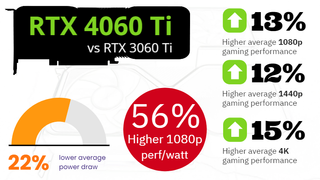
| Header Cell - Column 0 | RTX 4060 Ti | RTX 3060 Ti |
|---|---|---|
| GPU | AD106 | GA104 |
| Die size | 187.8mm² | 392.5mm² |
| Shaders | 4352 | 4864 |
| Memory | 8GB GDDR6 | 8GB GDDR6 |
| Bandwidth | 288 GB/s | 448 GB/s |
| TGP | 160W | 200W |
| Launch price | $399 | $399 |
You'd expect the RTX 4060 Ti to handily beat out the RTX 3060 Ti. And it consistently does at all resolutions, but not by a jaw dropping amount. In fact, if you look at the GPUs of both cards, its gains are all due to more cache, higher clock speeds, and superior TSMC process technology.
While the RTX 4060 Ti has a reasonable performance lead over the RTX 3060 Ti, the latter's specs help to keep it within striking distance.
The RTX 4060 Ti's AD106 GPU is much smaller and more power efficient than the GA104 GPU of the RTX 3060 Ti. It's also got a 128-bit bus vs 256-bit bus. So, while the RTX 4060 Ti has a reasonable performance lead over the RTX 3060 Ti, the latter's comparatively high-end specs help to keep it within striking distance.
The biggest gaming news, reviews and hardware deals
Keep up to date with the most important stories and the best deals, as picked by the PC Gamer team.
Of the two, the RTX 4060 Ti is the one to buy, though. The RTX 3060 Ti is still mostly around the $350 mark which isn't much of a drop from its $399 launch price in December 2020. Though you may recall it was priced dramatically higher during the peak of the mining craze in 2021.
Buying an RTX 4060 Ti absolutely makes sense at this price point if you're upgrading from an older card, but it makes far less sense if you've already got an RTX 3060 Ti. A sub-20% performance gain isn't worth the outlay, unless you're really attracted to the power consumption characteristics of the RTX 4060 Ti, you're looking to downsize to a small rig, or you're planning to sink a lot of hours into a game that supports DLSS 3 and Frame Generation. In that latter case, you'd be getting a lot more than just a 15% performance gain, but only in those specific games.
The RTX 3060 Ti remains a very good card that isn't running out of breath just yet. If you managed to snare one at its $399 launch price, you can consider yourself very lucky. But, barring any unforeseen mining demand, it's hard to see the RTX 4060 Ti doing anything but falling in price over the next couple of years. $300 to $350 isn't an unrealistic expectation. And at that point some RTX 3060 Ti owners might be compelled to take the plunge.
Nvidia RTX 4060 Ti vs RTX 3070
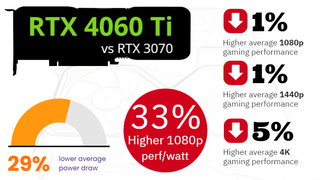
| Header Cell - Column 0 | RTX 4060 Ti | RTX 3070 |
|---|---|---|
| GPU | AD106 | GA104 |
| Die size | 187.8mm² | 392.5mm² |
| Shaders | 4352 | 5888 |
| Memory | 8GB GDDR6 | 8GB GDDR6 |
| Bandwidth | 288 GB/s | 448 GB/s |
| TGP | 160W | 220W |
| Launch price | $399 | $499 |
The RTX 3070 is fundamentally similar to the RTX 3060 Ti, with both sharing the GA104 GPU, though the RTX 3070's GPU has more shaders unlocked. This means it essentially ties with the RTX 4060 Ti in performance, with the RTX 3070's wider memory bus giving it the win by a nose at 4K.
The RTX 4060 Ti just wins. It should be winning by a mile though.
If you own an RTX 3070, then, there's little reason to upgrade. The RTX 4060 Ti's power consumption, along with DLSS 3 and Frame Generation support are definite points in its favor, but these alone aren't enough to overcome what would be a sidegrade at best.
The RTX 4060 Ti's inability to beat the RTX 3070 is one of the major headline weaknesses of the card. It's not unreasonable to expect the RTX 4060 Ti to beat out a card just one tier higher from the previous generation. This is an example of Nvidia's market misstep, deliberate or not. By putting what is essentially an entry level GPU into a mid range card, Nvidia missed a trick when it comes to encouraging enthusiasts to upgrade.
Given the narrow performance difference between the two, I'd buy the RTX 4060 Ti over the RTX 3070 today, but if the RTX 3070 remains in the market, and you see it in the $300 to $350 range, it becomes much more of a close run thing. If the RTX 3070 had a bit of extra VRAM, the choice would be clear, but it's sporting the same 8GB capacity, so the RTX 4060 Ti just wins. By rights, it should be winning by a mile, though.
Nvidia RTX 4060 Ti vs RTX 3070 Ti
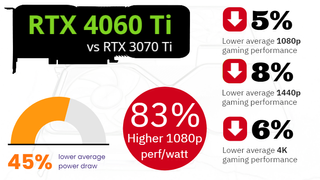
| Header Cell - Column 0 | RTX 4060 Ti | RTX 3070 Ti |
|---|---|---|
| GPU | AD106 | GA104 |
| Die size | 187.8mm² | 392.5mm² |
| Shaders | 4352 | 6144 |
| Memory | 8GB GDDR6 | 8GB GDDR6X |
| Bandwidth | 288 GB/s | 608 GB/s |
| TGP | 160W | 290W |
| Launch price | $399 | $599 |
The RTX 3070 Ti is the best performing GA104 equipped card. It contains the same GPU found in the RTX 3060 Ti and RTX 3070, but with all 6144 shaders unlocked and GDDR6X memory. That gives it a big shader advantage and well over double the bandwidth of the RTX 4060 Ti.
Then there's the price. At its launch price of $599, the RTX 3070 Ti was, and still is much more expensive.
You'd think the RTX 4060 Ti would struggle here, but a little surprisingly, it holds up fairly well against the RTX 3070 Ti. It does even better when it comes to performance per watt. The RTX 3070 Ti's 290W TDP is in another league compared to the 160W of the RTX 4060 Ti. Then there's the price. At its launch price of $599, the RTX 3070 Ti was, and still is, much more expensive than the RTX 4060 Ti.
If you're the owner of an RTX 3070 Ti, however, the RTX 4060 Ti is no threat. The RTX 4060 Ti retains its Ada Lovelace strengths though. DLSS 3 and Frame Generation support are welcome additions, but unless you play games that support them, there's really very little reason to downgrade to an RTX 4060 Ti, though if you're an ITX gamer, the cooler and quieter running might appeal.
Even now the RTX 3070 Ti is still priced well above the RTX 4060 Ti. They really aren't competing with one another. Therefore, given the choice between the two, the RTX 4060 Ti makes far more sense as a new purchase. Its cheaper price, and performance that draws within single digit percentages, makes it a better buy. It would have been really nice if the RTX 4060 Ti was capable of matching or beating the RTX 3070 Ti, but, alas, it's not to be.
RTX 3070 Ti owners are more likely to be looking at the RTX 4070 range, but that's a story for another vs article.
Nvidia RTX 4060 Ti vs RTX 3080
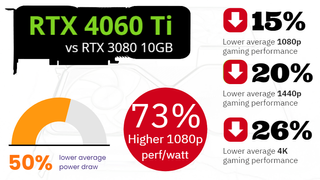
| Header Cell - Column 0 | RTX 4060 Ti | RTX 3080 |
|---|---|---|
| GPU | AD106 | GA102 |
| Die size | 187.8mm² | 628.4mm² |
| Shaders | 4352 | 8704 |
| Memory | 8GB GDDR6 | 10GB GDDR6X |
| Bandwidth | 288 GB/s | 760 GB/s |
| TGP | 160W | 320W |
| Launch price | $399 | $699 |
The RTX 3080 10GB stands out as one of the finest graphics cards Nvidia has ever released. It destroyed the RTX 20-series and at $699 it was priced very competitively. That is, when it launched. For a long time the RTX 3080 was plagued by miner-induced inflated pricing. Price aside, nearly three years after its launch, it can still hold its head up high.
If you're already rocking an RTX 3080, you can feel pretty damn good that you've got a card that still holds up well
The RTX 4060 Ti isn't a competitor, but how it does relatively against the RTX 3080 is a question many will pose. Given the the RTX 4060 Ti struggles to compete with the RTX 3070, comparisons with the RTX 3080 are largely moot, at least in terms of performance.
The RTX 3080 pulls ahead at higher resolutions. Along with its doubled core count, it's helped by its extra 2GB of VRAM and its major memory bandwidth advantage. In fact, a lead of 20% at 1440p and 26% at 4K is flattering to the RTX 4060 Ti, as our ray tracing heavy test suite benefits from the RTX 4060 Ti's 3rd generation RT cores.
The RTX 4060 Ti has its advantages. Obviously, it's a lot cheaper at $399 vs the $699 price tag of the RTX 3080. Its power consumption is half that of the RTX 3080 and it's a better choice for a low-powered small form factor rig. Playing older or esport games that run into the hundreds of FPS or are CPU limited don't require a high end graphics card.
The RTX 3080 isn't out of stock yet, but having heaped praise upon it, it's not the card to buy right now. An RTX 4070 class card would make more sense, but only as a replacement. If you're already rocking an RTX 3080, you can feel pretty damn good that you've got a card that still holds up well, and surely will do for a while yet.
Nvidia RTX 4060 Ti vs RTX 4060
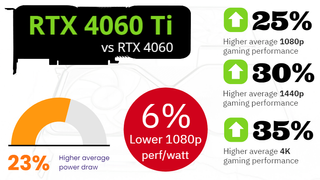
| Header Cell - Column 0 | RTX 4060 Ti | RTX 4060 |
|---|---|---|
| GPU | AD106 | AD107 |
| Die size | 187.8mm² | 158.7mm² |
| Shaders | 4352 | 3072 |
| Memory | 8GB GDDR6 | 8GB GDDR6 |
| Bandwidth | 288 GB/s | 272 GB/s |
| TGP | 160W | 115W |
| Launch price | $399 | $299 |
You might assume the RTX 4060 and RTX 4060 Ti are differentiated by relatively small variations, but that's incorrect. The RTX 4060 and RTX 4060 Ti are fundamentally different graphics cards, with a different GPU and a significant performance delta between them. That's all down to the name Nvidia assigned to them.
The RTX 4060 Ti is about 30% faster for about 30% more money. It's a pretty simple head-to-head when you boil it down to that.
The only significant similarity is their memory configuration. The RTX 4060 Ti includes 8GB of 18Gbps memory over a 128-bit bus. The RTX 4060 is all but the same, but includes slower 17Gbps memory instead. That's where the similarities end. The much higher shader count of the RTX 4060 Ti, at 4352 vs 3072 gives it a major shader advantage, and that shows up in the benchmarking data, where the RTX 4060 Ti pulls well ahead.
There's a $100 gap between the two. If you think about it in terms of price/performance, the RTX 4060 Ti, with around a 30% performance lead costs 33% more than the RTX 4060.
The RTX 4060 is a supremely efficient graphics card, even more so than the RTX 4060 Ti, and it's well suited for games that don't require lots of horsepower. If you're running older or less demanding games, the RTX 4060 is a perfectly viable option for a more budget-oriented gamer.
The technologies and feature sets of both cards are pretty similar. RT and Tensor core counts aside, both benefit from DLSS 3 and Frame Generation, at least in games that support them. More supporting games are launching all the time, and they'll help to give you that little bit of extra FPS where you need it, though they should not be considered solution to otherwise poor performance. Higher baseline performance is still more desirable.
We wish the RTX 4060 Ti had more memory, though. 8GB might become a bottleneck in the years ahead, but for now, you can think about the RTX 4060 Ti vs the RTX 4060 in simple dollar terms. If you're on a budget, the RTX 4060 is a good, but not stellar card. The RTX 4060 Ti is about 30% faster for about 30% more money. It's a pretty simple head-to-head when you boil it down to that. Which one you go for depends on how much you're willing to pay.
Nvidia RTX 4060 Ti vs RTX 4070
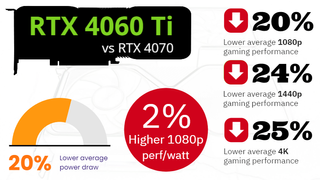
| Header Cell - Column 0 | RTX 4060 Ti | RTX 4070 |
|---|---|---|
| GPU | AD106 | AD104 |
| Die size | 187.8mm² | 294.5mm² |
| Shaders | 4352 | 5888 |
| Memory | 8GB GDDR6 | 12GB GDDR6X |
| Bandwidth | 288 GB/s | 504 GB/s |
| TGP | 160W | 200W |
| Launch price | $399 | $599 |
The RTX 4060 Ti and the RTX 4070 have a large performance delta between them, though at $399 vs $599 respectively, that is to be expected. Both cards are fundamentally quite different from one another.
If you plan to keep your graphics card for several years, the RTX 4070's performance lead and better memory subsystem are very good reasons to save up for one.
The RTX 4070 is built around the more powerful AD104 GPU. It's got a significant shader count advantage, at 5,888 vs the 4,352 of the RTX 4060 Ti. It's got the kind of memory configuration we wish the RTX 4060 Ti had, with 12GB of GDDR6X memory and a 192-bit bus. Its also got a full PCIe 4.0 x16 interface too. The RTX 4060 Ti makes do with an x8 connection.
Future and proofing are two dirty words when it comes to graphics cards, but that extra memory will see the RTX 4070 stand in good stead for longer than the RTX 4060 Ti. If you plan to keep your graphics card for several years, the RTX 4070's performance lead and better memory subsystem are very good reasons to save up for one.
Both are Ada Lovelace cards, with DLSS 3 and Frame Generation support. Both are generally cool and quiet running cards and are well suited to compact builds. The RTX 4070's performance per watt is excellent, and despite using 40W more than the RTX 4060 Ti, it's a statistical tie between them. The AD104 GPU really is very good and its performance, features, and characteristics are why the RTX 4070 is regarded as a highlight of the RTX 40-series.
The RTX 4060 Ti's cheaper price will ensure it will outsell the RTX 4070, but if you can afford it, or you're lucky to find the RTX 4070 at a discount, it's definitely the superior card and worth the extra, though $200 extra will be too much of a stretch for budget conscious buyers.
Nvidia RTX 4060 Ti vs RX 6700 XT
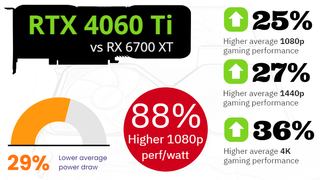
| Header Cell - Column 0 | RTX 4060 Ti | RX 6700 XT |
|---|---|---|
| GPU | AD106 | Navi 22 |
| Die size | 187.8mm² | 335mm² |
| Shaders | 4352 | 2560 |
| Memory | 8GB GDDR6 | 12GB GDDR6 |
| Bandwidth | 288 GB/s | 384 GB/s |
| TGP | 160W | 230W |
| Launch price | $399 | $479 |
The RTX 4060 Ti vs RX 6700 XT is arguably the most relevant Nvidia vs AMD comparison right now. RX 6800 supply is drying up quickly, and until we see AMD's RX 7700 and RX 7800 cards in action, the RX 6700 XT is AMDs next best competitor.
If you view ray tracing as a bit of eye candy and can do without it, then the RX 6700 XT remains a competitive option
An overview of both card's specs reveals strengths and weaknesses. The RTX 4060 Ti is by far the more power efficient card, but the RX 6700 XT isn't miles behind, with a 230W TGP vs 160W for the RTX 4060 Ti. The RX 6700 XT's 12GB of VRAM and bandwidth advantage are clear benefits too, while DLSS 3 and Frame Generation support are major RTX 4060 Ti advantages.
When it comes to performance, the at-a-glance results show the RTX 4060 Ti smashing the RX 6700 XT, but that's largely due to the strength of Nvidia's cards in ray tracing heavy benchmarks. In games like Cyberpunk 2077, the RTX 4060 Ti is in another league, but in traditionally rendered titles, the RX 6700 XT closes the gap to under 10% in many cases, though the RTX 4060 Ti does still lead in all of our tests.
The RX 6700 XT has been in the market for over two years, and its supply is expected to dry up as we move later into 2023. The RX 6750 XT is likely to remain longer but it's priced a little higher than the RX 6700 XT and is hurt by a higher TGP and a very small performance advantage over the RX 6700 XT.
Which one should you go for? The RTX 4060 Ti is the better card, but it's not ideal that it has a weaker memory configuration. If you view ray tracing as a bit of eye candy and can do without it, then the RX 6700 XT remains a competitive option, but only if you can find one in the low to mid $300 range. At $350 and higher the RTX 4060 Ti is still the better choice.
Nvidia RTX 4060 Ti vs RX 7600
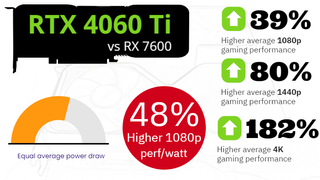
| Header Cell - Column 0 | RTX 4060 Ti | RX 7600 |
|---|---|---|
| GPU | AD106 | Navi 33 |
| Die size | 187.8mm² | 204mm² |
| Shaders | 4352 | 2048 |
| Memory | 8GB GDDR6 | 8GB GDDR6 |
| Bandwidth | 288 GB/s | 288 GB/s |
| TGP | 160W | 165W |
| Launch price | $399 | $269 |
The RX 7600 at $269 is more of a natural RTX 4060 competitor than it is an RTX 4060 Ti one at $399, but how they compare is a perfectly relevant question given the huge gap in AMDs lineup right now.
The RTX 4060 Ti is a much faster GPU, and it's priced higher accordingly. It obliterates the RX 7600 in ray traced titles
The RX 7600 and the RTX 4060 Ti share some similarities. Both come with a 128-bit memory bus, 8GB of 18Gbps GDDR6 memory and a PCIe 4.0 x8 interface. These are the kinds of specs expected of a low end GPU as the RX 7600 is. A lot of the RTX 4060 Ti's criticisms are rightly highlighted when viewed in that context.
But the RTX 4060 Ti is a much faster slice of graphics silicon, and it's priced higher accordingly. It obliterates the RX 7600 in ray traced titles. Just look at how it pulls away as the resolution gets higher! The RX 7600 does better in raster performance than those ugly-looking 1440p and 4K results would suggest, but the RTX 4060 Ti is still faster across the board.
Both cards come with the same 165W TDP, but the performance advantage of the RTX 4060 Ti sees its pull well ahead in performance per watt. Nvidia's ray tracing performance, DLSS 3 support, and Frame Generation tech is something that AMD cannot match, though it has high hopes for its competing FSR 3 tech later in the year.
The RTX 4060 Ti is clearly the better of the two cards but it's also nearly 50% more expensive than the RX 7600 and that alone means they aren't really competing with each other. Imagine if Nvidia was to bring the price of the RTX 4060 Ti to the $320 range, if not $300? AMD would be in a world of hurt.
Nvidia RTX 4060 Ti benchmarks














Chris' gaming experiences go back to the mid-nineties when he conned his parents into buying an 'educational PC' that was conveniently overpowered to play Doom and Tie Fighter. He developed a love of extreme overclocking that destroyed his savings despite the cheaper hardware on offer via his job at a PC store. To afford more LN2 he began moonlighting as a reviewer for VR-Zone before jumping the fence to work for MSI Australia. Since then, he's gone back to journalism, enthusiastically reviewing the latest and greatest components for PC & Tech Authority, PC Powerplay and currently Australian Personal Computer magazine and PC Gamer. Chris still puts far too many hours into Borderlands 3, always striving to become a more efficient killer.
Most Popular


